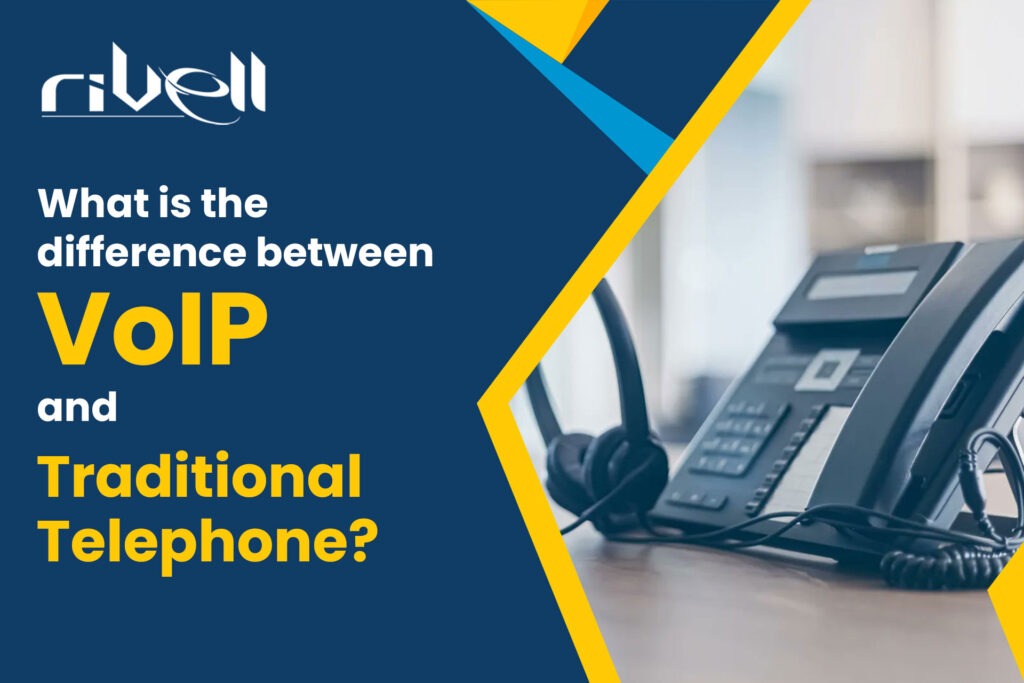In the ever-evolving landscape of communication technologies, the shift from traditional telephone systems to Voice over Internet Protocol (VoIP) has become increasingly prevalent. Both technologies serve the fundamental purpose of connecting individuals over long distances, yet they employ distinct methodologies. In this blog, we will delve into the differences between VoIP and traditional telephone systems, examining their unique features, advantages, and potential considerations for users.
What is VoIP?
Voice over Internet Protocol, commonly known as VoIP, is a technology that enables voice communication and multimedia sessions over the Internet. Unlike traditional telephone systems that rely on dedicated analog lines, VoIP converts voice signals into digital data packets, transmitting them through the internet to the recipient. This innovative approach to communication has revolutionized the way individuals and businesses connect, offering a cost-effective and feature-rich alternative to traditional phone systems.
How Does VoIP Work?
1. Voice Conversion
VoIP transforms analog voice signals into digital data, breaking down conversations into packets of information.
2. Packet Transmission
These digital packets are transmitted over the Internet using Internet Protocol (IP) technology.
3. Packet Reassembly
Upon reaching the destination, the digital packets are reassembled back into voice signals for the recipient to hear.
VoIP utilizes existing internet infrastructure, making it a versatile and accessible solution for voice communication.
Advantages of VoIP
1. Infrastructure
Unlike traditional telephony, VoIP relies on broadband internet connections for transmission. It utilizes existing data networks, eliminating the need for separate infrastructure dedicated to voice communication.
2. Cost Efficiency
VoIP often proves more cost-effective due to the shared infrastructure and reduced maintenance costs. International calls, in particular, can be significantly cheaper than with traditional phone services.
3. Flexibility and Mobility
VoIP services offer unparalleled flexibility, allowing users to make calls from anywhere with an internet connection. Additionally, features such as call forwarding and voicemail-to-email enhance mobility and accessibility.
4. Additional Features
VoIP systems typically come with a range of advanced features, including video conferencing, instant messaging, and integration with other digital applications. These features contribute to a more versatile communication experience.
What is a Traditional Phone System?
A traditional phone system, often referred to as a landline or Public Switched Telephone Network (PSTN), relies on a dedicated analog infrastructure to facilitate voice communication. Unlike Voice over Internet Protocol (VoIP), which converts voice signals into digital data for transmission over the internet, traditional phone systems use copper wires to carry analog signals between telephones connected to the Public Switched Telephone Network.
1. Infrastructure
Traditional telephone systems utilize a dedicated network of copper wires and physical infrastructure for voice communication. This infrastructure requires constant maintenance and is more susceptible to wear and tear.
2. Dependence on Geographical Location
Traditional telephone systems are limited by geographical location. Users are bound to specific physical lines, making it challenging to relocate or establish communication in areas lacking infrastructure.
3. Maintenance and Upkeep
Maintenance costs for traditional phone systems can be higher due to the need for physical infrastructure upkeep. Repairs and upgrades may involve substantial time and financial investments.
4. Limited Features
Traditional telephone systems generally offer basic voice communication capabilities with limited additional features. Features such as voicemail and call waiting may be available but are not as advanced as those in VoIP systems.
5. Cost Structure:
While local calls are often included in a flat monthly fee, international calls and additional services may incur higher charges compared to VoIP.
How Do Traditional Phone Systems Work?
1. Analog Signals
Traditional phones generate analog signals corresponding to the variations in air pressure caused by the speaker’s voice.
2. Copper Wire Transmission
These analog signals travel through copper wires to the local exchange or central office.
3. Switching
At the central office, the analog signals are switched to connect the call to the recipient’s telephone.
4. Analog Reconversion
The analog signals are reconverted at the recipient’s end, allowing them to hear the voice of the caller.
Traditional phone systems operate through a network of physical infrastructure, requiring dedicated lines for each connection.
Differences between VoIP and traditional telephone
Explore the fundamental differences between these two communication technologies, shedding light on their features, functionalities, advantages, and drawbacks.
1. Infrastructure
-
VoIP:
- Leverages the internet to transmit voice data in digital packets.
- Operates on existing internet connections, utilizing IP technology for communication.
-
Traditional Telephony:
- Relies on a dedicated analog network of copper wires.
- The infrastructure is dedicated solely to voice communication.
2. Cost Efficiency
-
VoIP:
- Typically more cost-effective, especially for long-distance and international calls.
- Utilizes existing internet connections, reducing the need for additional infrastructure.
-
Traditional Telephony:
- May result in higher costs for long-distance calls, especially for international communication.
- Involves dedicated phone lines and infrastructure, contributing to higher maintenance costs.
3. Flexibility and Scalability
-
VoIP:
- Highly flexible, allowing users to make calls from any device connected to the internet.
- Easily scalable for business growth, often requiring minimal additional hardware.
-
Traditional Telephony:
- Limited flexibility, often requiring additional hardware and infrastructure for expansion.
- Scalability may involve complex rewiring and adjustments to the existing infrastructure.
4. Features and Functionality
-
VoIP:
- Offers advanced features like video conferencing, voicemail-to-email, call forwarding, and integration with other software applications.
- Provides a rich set of communication tools, enhancing overall user experience.
-
Traditional Telephony:
- Basic features include call waiting, voicemail, and caller ID, with limited integration capabilities.
- Traditional phone systems focus primarily on voice communication, lacking the advanced features of VoIP.
5. Reliability
-
VoIP:
- Reliability depends on the quality of the internet connection.
- May experience service interruptions during internet outages.
-
Traditional Telephony:
- Historically considered more reliable, as it operates independently of internet connectivity.
- Typically experiences fewer disruptions during power outages or internet downtime.
6. Maintenance and Upgrades
-
VoIP:
- Generally easier to maintain and upgrade through software updates.
- Hardware upgrades may be necessary for certain advanced features.
-
Traditional Telephony:
- Hardware-centric, often requiring more extensive maintenance and upgrades.
- Upgrades may involve rewiring and replacing outdated equipment.
7. Geographical Accessibility
-
VoIP
- Offers geographical flexibility, enabling users to have a local phone number in one location while physically being in another.
- Supports virtual phone numbers to create a global presence.
-
Traditional Telephony:
- Tied to physical locations, making it challenging to have a local number in a different area.
- Lacks the geographic flexibility provided by VoIP.
8. Environmental Impact
-
VoIP:
- Generally considered more environmentally friendly, as it relies on existing internet infrastructure.
- Requires less physical equipment and resources compared to traditional telephony.
-
Traditional Telephony:
- Involves manufacturing and maintaining physical infrastructure, contributing to a larger environmental footprint.
- The dedicated nature of traditional phone lines may result in higher resource consumption.
Considerations for Choosing Between VoIP and Traditional Telephone
1. Internet Reliability
VoIP is dependent on a stable internet connection. In areas with unreliable or slow internet, traditional telephone systems may be a more suitable choice.
2. Budgetary Constraints
Consider your budget constraints and the long-term cost implications. While VoIP may offer initial savings, traditional telephone systems could be more cost-effective in certain scenarios.
3. Feature Requirements
Assess the features essential for your communication needs. If advanced features and flexibility are critical, VoIP may be the preferable option.
4. Geographical Flexibility
Evaluate the geographic flexibility required for your communication. If your organization or personal needs involve frequent relocation, VoIP’s mobility advantages may be crucial.
VoIP vs. Traditional Telephone Systems
| Aspect | VoIP | Traditional Telephone |
| Definition | Voice over Internet Protocol | Traditional Telephony |
| Infrastructure | Relies on broadband internet connections | Uses copper wire network |
| Cost Efficiency | Often more cost-effective due to shared infrastructure | Costs can be higher due to dedicated lines |
| Flexibility & Mobility | Allows calls from anywhere with an internet connection | Limited mobility, tied to physical lines |
| Additional Features | Advanced features like video conferencing and IM | Basic voice communication |
Considerations for Choosing VoIP VS Traditional Telephone
| VoIP | Traditional Telephone | |
| Internet Reliability | Requires a stable internet connection | Less dependent on internet, more reliable in certain areas |
| Budgetary Constraints | Initial savings may be higher | Potential long-term cost savings in specific scenarios |
| Feature Requirements | Ideal for users requiring advanced features | Suitable for basic communication needs |
| Geographical Flexibility | Highly suitable for organizations with remote workers | Limited flexibility, challenging for frequent relocations |
Frequently Asked Questions on VoIP vs. Traditional Telephone Systems:
1. What is the difference between VoIP and traditional telephone lines?
VoIP (Voice over Internet Protocol) uses the internet to transmit voice as digital data packets, while traditional telephone lines, also known as PSTN (Public Switched Telephone Network), use dedicated circuit-switched networks and analog signals.
2. Will VoIP replace traditional telephony?
While VoIP is becoming increasingly popular, it’s unlikely to entirely replace traditional telephony. Both systems have their strengths, and the choice depends on factors like infrastructure, geographic location, and specific communication needs.
3. What are the differences between VoIP services compared with traditional telephony using PSTN?
VoIP services offer cost-effective international calls, advanced features like video conferencing, and flexibility in mobility. Traditional telephony relies on physical infrastructure, has geographic limitations, and may have higher international calling costs.
4. Is VoIP a landline or cellular?
VoIP can be used for both landline and cellular communication. It operates over the internet, making it versatile for various devices such as desk phones, smartphones, or computers.
5. What is the advantage of using VoIP instead of traditional telephone systems?
Advantages of VoIP include cost savings, advanced features (video conferencing, instant messaging), flexibility in mobility, scalability, and integration with other digital applications.
Conclusion
Both VoIP and traditional telephone systems have their merits and drawbacks. The choice between the two depends on individual or organizational requirements, budget considerations, and the level of technological infrastructure available. As technology continues to advance, the communication landscape will undoubtedly witness further transformations, offering users even more choices in the years to come.
If you’re seeking a reliable VoIP service, consider exploring the offerings of companies like Rivell, known for providing cutting-edge VoIP Phone services that cater to the diverse needs of modern communication. Call at (856) 603 0000 or Submit Contact form.
Read these articles below to learn more about VoIP:
Which technology can be used to protect VoIP against eavesdropping?
How do I choose a VoIP provider for my business?









